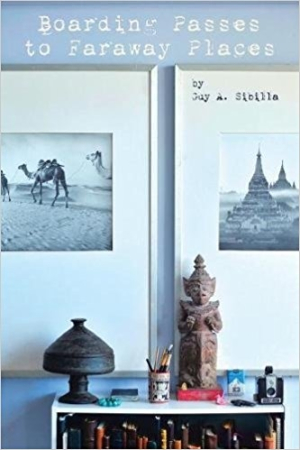Conversational in tone and thoroughly engaging, this travel narrative expresses joy at seeing just how many good, kind people there are in the world.
In Boarding Passes to Faraway Places, seasoned adventurer and travel writer Guy A. Sibilla, who calls himself “a hapless rambler with little regard for a world with borders,” recounts the sense of wonderment and exuberance that wandering the planet without a plan can bring.
By his teens, Sibilla, the son of an Italian American US Army serviceman and a Japanese mother, had spent half his life abroad. Not surprisingly, he became a travel writer. He has trekked throughout the Americas, Europe, Africa, Asia, Australia, and the Pacific Basin, keeping lively accounts of his travels in journals that are as much scrapbook as notepad.
Boarding Passes to Faraway Places celebrates the act of movement itself as it shares Sibilla’s love for discovering people, places, and cultures that mere tourists will never know—journeys taken on foot, on horseback, in canoes, and on buses, traversing deserts, jungles, mountains, glaciers and crevasses, tightly-packed towns, and remote outposts carrying the bare necessities in his backpack. “Wherever I ended up, even for a day, I was home,” he writes.
The book covers the years 2000 through 2007 and Sibilla’s travels to India, Pakistan, Myanmar (Burma), the cities and deserts of Syria and Jordan, Togo with its voodoo culture, the jungles of Belize, Guatemala, and Mexico, Rapa Nui (Easter Island), and the war zone of Timor-Leste. Captivating and colorful, its descriptions bring these places and their people to life. India was “the most exotic, disgusting, enchanting, appalling, poetic, filthy, bewildering, beguiling place on earth,” and his romanticized visions of Indian monastic life were shattered by the reality of a friend’s Dharamsala monastery accommodations: “a Motel 6 from hell.” Yet India, a luminous land of contrasts, taught him “to grab poetry from the air” around him.
Other contrasts are as vivid: the total devastation of East Timor contrasted with the brilliant beauty of the three-hundred-foot-high dome of Burma’s Shwedagon Pagoda, covered in gold, diamonds, rubies, and sapphires; Buddhist monks in timeless robes, their shaved heads hunched over computer screens in Dharamsala; Damascus, the site of bitter conflicts between politics and religion and at the same time home to some of mankind’s highest aspirations; and, after so much movement, the refreshing time spent breaking bread and swapping songs with Bedouins in the desert, sleeping on the red sand beneath the Milky Way with shooting stars falling into his hair.
Conversational in tone and thoroughly engaging, the narrative expresses both the dangers encountered and the joy of seeing just how many good, kind people there are in the world. There is also plenty of wry humor; it’s both scary and funny to see the words, “Oh! God Save Me!” painted on the front bumper of a bus navigating hairpin turns in mountainous terrain. The text presents some errors in grammar, syntax, spelling, and subject-verb agreement, and there is an odd shift to US involvement in a coup d’état in Chile in the midst of a section on Tahiti.
If Guy A. Sibilla’s Boarding Passes to Faraway Places has one overriding message besides excitement, adventure, and learning the truth that “there are few gifts more precious than living a day exceptionally well,” it’s surely this: “Don’t let fear keep you from taking chances, sometimes even with your life. Joy and wonder live there.”

No comments:
Post a Comment